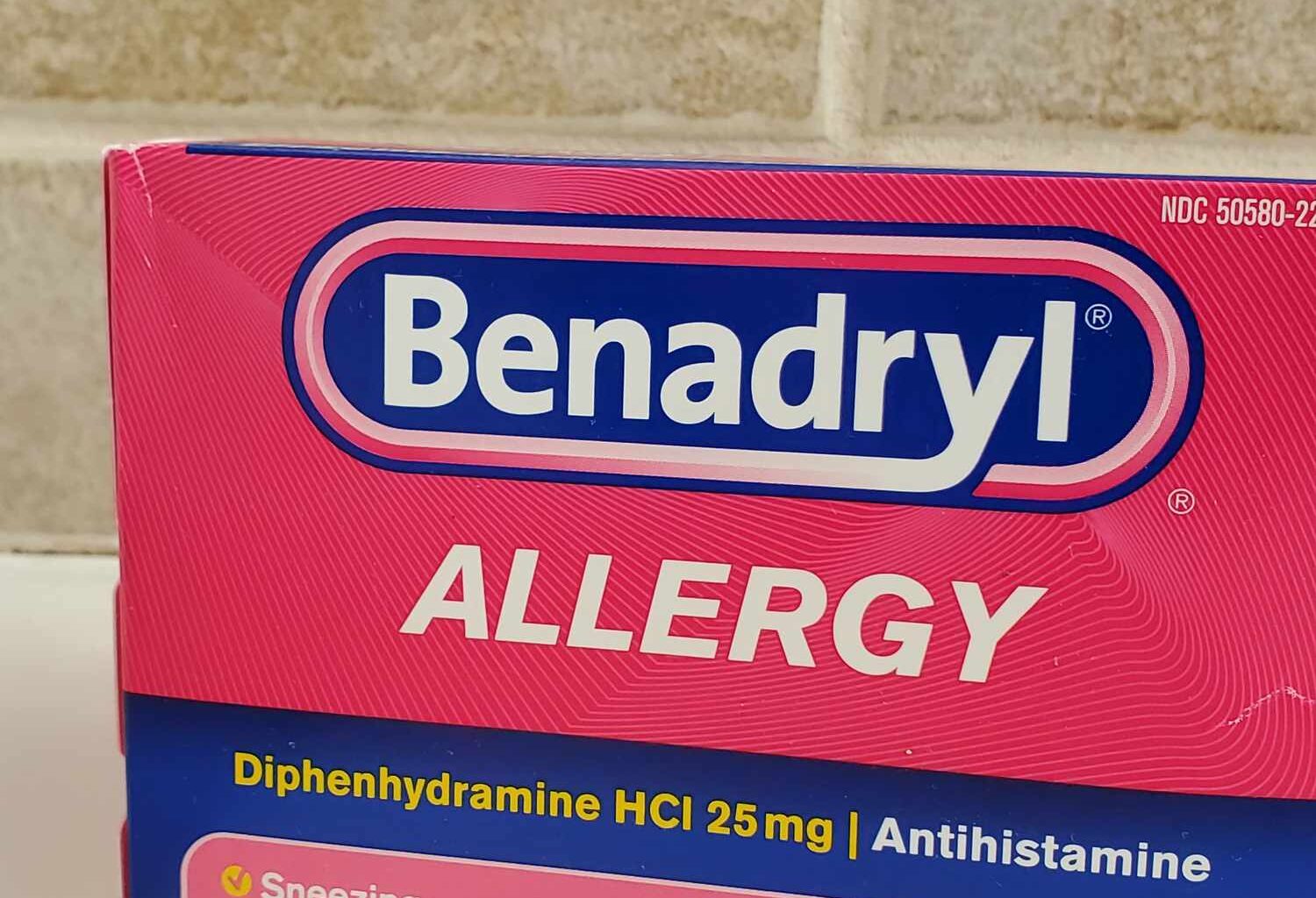Benadryl (diphenhydramine), an antihistamine used to relieve allergy and cold symptoms, can cause some serious side effects, especially when taken incorrectly.
A new review published in the World Allergy Organization Journal urges a reevaluation of the drug’s safety, arguing its risks now outweigh its benefits.
Documented Side Effects of Benadryl
According to the review, diphenhydramine (the active ingredient in Benadryl) was approved by the Food and Drug Administration (FDA) in 1946, well before today’s more rigorous drug testing standards.
Since then, severe side effects—including sedation and impaired concentration—have become well documented. Meanwhile, newer antihistamines with safer profiles, like Allegra (fexofenadine), are now widely available.
“The authors correctly note that diphenhydramine, like other over-the-counter medications, is often believed to be a ‘safe’ drug by consumers. However, like all medications, diphenhydramine use is associated with side effects, including drowsiness and poor concentration, which can be severe in some cases,” Kelly Johnson-Arbor, MD, a medical toxicologist at MedStar Georgetown University Hospital who was not involved in the research, told Verywell in an email.
Diphenhydramine has also been linked to potentially life-threatening side effects, and it should only be used as directed on the package label, she added.
Here are some of the potential severe side effects.
1. Sedation
Benadryl is sometimes used as a sleep aid for insomnia, but people who take the drug for other reasons may feel drowsy. It is not recommended to drive after taking Benadryl, and according to older research, it may have a worse effect on driving than alcohol for some people.
“Even though diphenhydramine is a sedating medication, it can cause paradoxical agitation in some individuals, and children are especially at risk for developing this side effect,” Johnson-Arbor said.
2. Hallucinations and Cognitive Impairment
Benadryl can cause headaches and dizziness. People who take too much Benadryl may experience confusion or hallucinations.
“Chronic use of first-generation antihistamines, like diphenhydramine, is also linked to an increased risk of dementia,” Johnson-Arbor said.
3. Vision Problems
Benadryl may cause blurred vision and dry eyes. People with glaucoma, a group of eye diseases that cause optic nerve damage, are advised to consult a trusted healthcare provider before taking Benadryl because this medication may trigger eye pain, foggy vision, or other issues.
4. Difficulty Urinating or Painful Urination
Some people might have bladder problems when taking Benadryl. It’s recommended to consult a trusted healthcare provider right away if you have trouble urinating while taking this medication.
5. Overdose
Taking large doses of Benadryl can result in serious side effects like cardiac arrest, coma, seizures, and death. Multiple people have died in recent years after taking too much of this drug as part of the TikTok “Benadryl Challenge.”
“Even taking slightly higher than recommended doses of diphenhydramine may result in sleepiness, confusion, and difficulties with concentration, especially in children and older adults,” Johnson-Arbor said.
What Can You Take Instead of Benadryl?
First-generation oral antihistamines, like Benadryl, cross the blood-brain barrier and can cause drowsiness and make it harder to concentrate. Newer oral antihistamines don’t cross the blood-brain barrier as easily.
These second-generation antihistamines could be better alternatives to Benadryl, including:
“These newer, safer options are preferred, and they work just as well for most people, without the drowsiness or cognitive risks,” Clifford Bassett, MD, an allergist at NYU Langone Health, told Verywell in an email.
Bassett added that people who need help managing chronic symptoms should speak with a healthcare provider, such as an allergist, to identify triggers and determine the safest medications for their needs.
Verywell Health uses only high-quality sources, including peer-reviewed studies, to support the facts within our articles. Read our editorial process to learn more about how we fact-check and keep our content accurate, reliable, and trustworthy.
Clark JH, Meltzer EO, Naclerio RM. Diphenhydramine: It is time to say a final goodbye. World Allergy Organ J. 2025;18(2):101027. doi:10.1016/j.waojou.2025.101027
MedlinePlus. Fexofenadine.
MedlinePlus. Diphenhydramine.
Poison Control. Benadryl: side effects, interactions, and overdose.
American Academy of Ophthalmology. Common drugs that can worsen glaucoma.
Nishino T, Wakai S, Aoki H, Inokuchi S. Cardiac arrest caused by diphenhydramine overdose. Acute Med Surg. 2018;5(4):380-383. doi:10.1002/ams2.351
Elkhazeen A, Poulos C, Zhang X, Cavanaugh J, Cain M. A TikTok TM “Benadryl Challenge” death—a case report and review of the literature. J Forensic Sci. 2023;68(1):339-342. doi:10.1111/1556-4029.15149
U.S. Food and Drug Administration. FDA warns about serious problems with high doses of the allergy medicine diphenhydramine (Benadryl).
American Academy of Allergy, Asthma, and Immunology. Antihistamines: if/when are first generation medications advantageous over newer antihistamines?

Thanks for your feedback!
What is your feedback?
Helpful
Report an Error
Other

